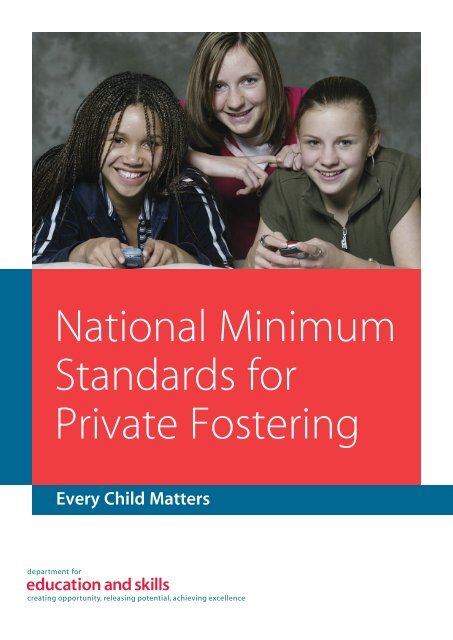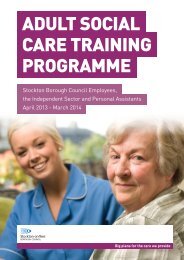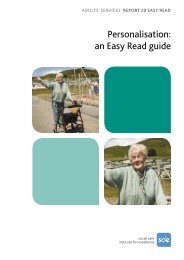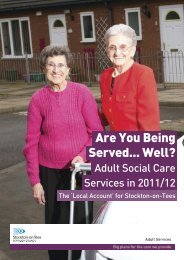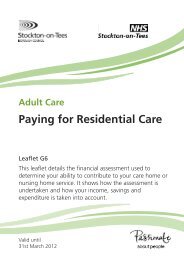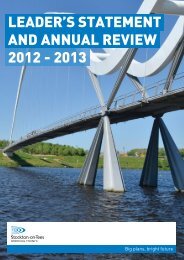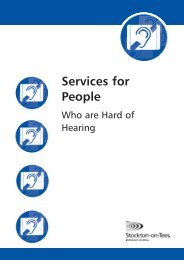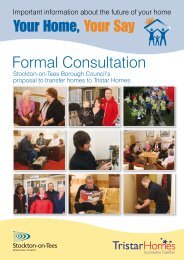National Minimum Standards for Private Fostering - Torbay Council
National Minimum Standards for Private Fostering - Torbay Council
National Minimum Standards for Private Fostering - Torbay Council
You also want an ePaper? Increase the reach of your titles
YUMPU automatically turns print PDFs into web optimized ePapers that Google loves.
<strong>National</strong> <strong>Minimum</strong><br />
<strong>Standards</strong> <strong>for</strong><br />
<strong>Private</strong> <strong>Fostering</strong><br />
Every Child Matters
Contents<br />
General Introduction 2<br />
Definition of a <strong>Private</strong> <strong>Fostering</strong> Arrangement 2<br />
Regulatory Context 3<br />
Impact on Local Authorities 3<br />
The Role of the Commission <strong>for</strong> Social Care Inspection 3<br />
Further In<strong>for</strong>mation 3<br />
<strong>National</strong> <strong>Minimum</strong> <strong>Standards</strong> <strong>for</strong> <strong>Private</strong> <strong>Fostering</strong> 4<br />
Introduction 4<br />
Structure and Approach 4<br />
1 Statement on <strong>Private</strong> <strong>Fostering</strong> (Standard 1) 6<br />
2 Notification (Standard 2) 8<br />
3 Safeguarding and Promoting Welfare (Standard 3) 10<br />
4 Advice and Support (<strong>Standards</strong> 4-6) 12<br />
5 Monitoring Compliance with Duties and Functions (Standard 7)<br />
in relation to <strong>Private</strong> <strong>Fostering</strong> 15<br />
Annex A: The Children (<strong>Private</strong> Arrangements <strong>for</strong> <strong>Fostering</strong>) Regulations 2005 17<br />
1
General Introduction<br />
This document contains the <strong>National</strong> <strong>Minimum</strong> <strong>Standards</strong> <strong>for</strong> <strong>Private</strong> <strong>Fostering</strong> which came<br />
into <strong>for</strong>ce on 18 July 2005, and the Children (<strong>Private</strong> Arrangements <strong>for</strong> <strong>Fostering</strong>)<br />
Regulations 2005.<br />
DEFINITION OF A PRIVATE FOSTERING ARRANGEMENT<br />
A private fostering arrangement is essentially one that is made privately (that is to say<br />
without the involvement of a local authority) <strong>for</strong> the care of a child under the age of 16<br />
(under 18, if disabled) by someone other than a parent or close relative with the intention<br />
that it should last <strong>for</strong> 28 days or more. <strong>Private</strong> foster carers may be from the extended family<br />
such as a cousin or great aunt. However, a person who is a relative under the Children Act<br />
1989 i.e. a grandparent, brother, sister, uncle or aunt (whether of full blood or half blood or<br />
by marriage) or step-parent will not be a private foster carer. A private foster carer may be a<br />
friend of the family, the parent of a friend of the child, or someone previously unknown to<br />
the child’s family who is willing to privately foster a child. The period <strong>for</strong> which the child is<br />
cared <strong>for</strong> and accommodated by the private foster carer should be continuous, but that<br />
continuity is not broken by the occasional short break. Exemptions to this definition are set<br />
out in Schedule 8 to the Children Act 1989.<br />
The private foster carer becomes responsible <strong>for</strong> providing the day to day care of the child<br />
in a way which will promote and safeguard his welfare. Overarching responsibility <strong>for</strong><br />
2
safeguarding and promoting the welfare of the privately fostered child remains with the<br />
parent or other person with parental responsibility.<br />
REGULATORY CONTEXT<br />
The 2005 regulations are made under the Children Act 1989. The <strong>National</strong> <strong>Minimum</strong><br />
<strong>Standards</strong> are issued under section 7 of the Local Authority Social Services Act 1970, which<br />
requires local authorities in their social services functions to act under the general guidance<br />
of the Secretary of State. As such the <strong>National</strong> <strong>Minimum</strong> <strong>Standards</strong> do not have the full <strong>for</strong>ce<br />
of statute, but should be complied with unless local circumstances indicate exceptional<br />
reasons which justify a variation.<br />
IMPACT ON LOCAL AUTHORITIES<br />
The NMS specify a minimum standard <strong>for</strong> local authority practice in the fulfilment of<br />
Children Act duties and functions in relation to private fostering. They, along with the new<br />
measures in section 44 of the Children Act 2004 and the 2005 regulations, are intended to<br />
better focus local authorities’ attention on private fostering, in part by requiring them to<br />
take a more proactive approach to identifying arrangements in their area.<br />
The Commission <strong>for</strong> Social Care Inspection (CSCI) will consider and consult on how it can<br />
most effectively contribute to ensuring that these standards are met. The approach taken<br />
seeks to minimise the impact on local authorities, while enabling effective assessment of<br />
whether the standards are being implemented in a way which ensures that the welfare of<br />
privately fostered children is safeguarded and promoted.<br />
THE ROLE OF THE COMMISSION FOR SOCIAL CARE INSPECTION<br />
CSCI is the independent inspectorate <strong>for</strong> social care services in England. The primary<br />
function of CSCI is to promote improvement in social care. CSCI has a specific duty to<br />
safeguard and promote the rights and welfare of children. In making judgements, CSCI<br />
focuses on the experience and outcomes of children and young people. CSCI seeks also to<br />
recognise and promote good practice above these <strong>National</strong> <strong>Minimum</strong> <strong>Standards</strong>.<br />
CSCI views the way in which a local authority discharges its duties and functions in relation<br />
to private fostering within the context of the per<strong>for</strong>mance assessment of local councils’<br />
social services. CSCI inspections are used as a plat<strong>for</strong>m to facilitate improvement.<br />
FURTHER INFORMATION<br />
The <strong>National</strong> <strong>Minimum</strong> <strong>Standards</strong> and 2005 regulations are the responsibility of the<br />
Secretary of State <strong>for</strong> Education and Skills. The Commission will advise on the application of<br />
the standards and regulations in particular circumstances. Other queries – <strong>for</strong> example<br />
about the policies behind the standards and regulations- can be addressed to the<br />
Department <strong>for</strong> Education and Skills.<br />
3
<strong>National</strong> <strong>Minimum</strong><br />
<strong>Standards</strong> <strong>for</strong> <strong>Private</strong><br />
<strong>Fostering</strong><br />
INTRODUCTION<br />
The <strong>National</strong> <strong>Minimum</strong> <strong>Standards</strong> <strong>for</strong> private fostering are issued by the Secretary of State<br />
<strong>for</strong> Education and Skills under section 7 of the Local Authority Social Services Act 1970. The<br />
Secretary of State keeps such standards under review and may publish amended standards<br />
as appropriate.<br />
These standards apply to Local Authorities. They are minimum standards, rather than `best<br />
possible’ practice. Many local authorities will exceed the <strong>National</strong> <strong>Minimum</strong> <strong>Standards</strong> in a<br />
range of ways. It is hoped that they will focus local authorities’ attention on private fostering<br />
and lead to improvements in the way in which they carry out their duties and functions in<br />
relation to private fostering.<br />
STRUCTURE AND APPROACH<br />
The standards are grouped under a series of key topics:<br />
●<br />
●<br />
●<br />
●<br />
●<br />
Statement on private fostering<br />
Notification<br />
Safeguarding and promoting welfare<br />
Advice and support<br />
Monitoring compliance<br />
4
Each standard or group of standards is preceded by a statement of the outcome to be<br />
achieved by the local authority. The standards are intended to be qualitative, but they are<br />
also designed to be measurable.<br />
In inspecting against these standards, CSCI will follow a proportionate inspection<br />
methodology, which enables consistent judgements to be made and reported across the<br />
country. Practice which exceeds the requirements of the standards will also be identified,<br />
recognised and reported through inspection reports.<br />
It is intended that the standards will be used by local authorities and by the Commission, to<br />
focus on securing positive outcomes <strong>for</strong> privately fostered children and young people, and<br />
reducing any risks to their welfare and safety. Observing the standards is an essential part,<br />
but only a part, of the local authority’s overall responsibility to safeguard and promote the<br />
welfare of each privately fostered child.<br />
5
Statement on <strong>Private</strong><br />
<strong>Fostering</strong> (Standard 1)<br />
OUTCOME<br />
Relevant staff are aware of local authority duties and functions in relation to private<br />
fostering.<br />
STANDARD 1<br />
1.1 The local authority has a written statement or plan, which sets out its duties and<br />
functions in relation to private fostering and the ways in which they will be carried<br />
out.<br />
SUPPORTING CRITERIA<br />
1.2 The statement or plan includes:<br />
●<br />
●<br />
●<br />
the legal definition of a privately fostered child and a list of examples;<br />
the local authority’s duties and functions under the Children Act 1989 and the<br />
Children (<strong>Private</strong> Arrangements <strong>for</strong> <strong>Fostering</strong>) Regulations 2005, and how they<br />
will operate in relation to privately fostered children;<br />
how relevant staff will be trained to ensure they have appropriate understanding<br />
and expertise in relation to private fostering;<br />
6
●<br />
●<br />
●<br />
●<br />
●<br />
●<br />
●<br />
●<br />
●<br />
the name of a person within the local authority with expertise in private fostering,<br />
whom social workers can contact <strong>for</strong> advice;<br />
the name of the manager(s) who will sign-off decisions about the overall<br />
suitability of an arrangement;<br />
how awareness of the notification requirements will be promoted with other<br />
agencies and within the wider local community;<br />
how the local authority will determine the suitability of all aspects of a private<br />
fostering arrangement in accordance with the regulations;<br />
how the local authority will satisfy itself that the welfare of privately fostered<br />
children in their area is satisfactorily safeguarded and promoted;<br />
the advice and support that will be available to private foster carers (including<br />
prospective private foster carers), parents and others with parental responsibility,<br />
and others concerned with the privately fostered child;<br />
the in<strong>for</strong>mation and support that will be available to privately fostered children;<br />
any training that may be available to private foster carers (including prospective<br />
private foster carers); and<br />
the role of other agencies in assisting the local authority to carry out its duty<br />
under section 67(1) of the Children Act 1989, in particular through notifying the<br />
authority of an arrangement where they are not satisfied that the local authority<br />
have been, or will be, notified of that arrangement.<br />
1.3 All relevant staff have an appropriate understanding of the local authority’s duties<br />
and functions in relation to private fostering.<br />
1.4 The local authority ensures that its duties and functions in relation to private<br />
fostering are included in induction and other training programmes. The programmes<br />
are annually reviewed in line with changes in legislation and/or guidance and<br />
regularly evaluated by staff and managers.<br />
7
Notification (Standard 2)<br />
OUTCOME<br />
The local authority is notified about privately fostered children living in its area.<br />
STANDARD 2<br />
2.1 The local authority:<br />
2.1.1 promotes awareness of the notification requirements and ensures that those<br />
professionals who may come into contact with privately fostered children<br />
understand their role in notification;<br />
2.1.2 responds effectively to notifications; and<br />
2.1.3 deals with situations where an arrangement comes to their attention, which has<br />
not been notified.<br />
SUPPORTING CRITERIA<br />
2.2 Promoting Awareness<br />
2.2.1 The local authority has a programme of communication activities, including <strong>for</strong> the<br />
public, local authority staff and other agencies, and a range of up to date publicity<br />
materials which includes the legal definition of a privately fostered child with<br />
8
examples, the notification requirements and the procedure <strong>for</strong> notifying, and the<br />
benefits of notification and possible consequences of non-notification.<br />
2.2.2 The publicity materials identify who to contact in the local authority <strong>for</strong> in<strong>for</strong>mation<br />
about notification or about other aspects of private fostering. The publicity materials<br />
are available in an appropriate range of languages and <strong>for</strong>mats, which are accessible<br />
to different groups of private foster carers, parents and communities.<br />
2.2.3 The local authority provides targeted and current in<strong>for</strong>mation to those who may<br />
come into contact with privately fostered children, including teachers, health visitors,<br />
nurses, doctors, housing officers and community workers, about their role in assisting<br />
the local authority to carry out its duty under section 67(1) of the Children Act 1989,<br />
including through notifying the local authority of an arrangement where they are not<br />
satisfied that the local authority have been, or will be, notified of that arrangement.<br />
2.3 Responding to Notifications<br />
2.3.1 The local authority takes appropriate action on receipt of a notification, and carries<br />
out subsequent visits, in accordance with the regulations.<br />
2.3.2 The local authority handles disqualifications effectively.<br />
2.3.3 The local authority has in place and implements effectively a policy and agreed<br />
process <strong>for</strong> prohibiting private fostering arrangements and <strong>for</strong> imposing<br />
requirements where appropriate.<br />
2.3.4 Where the local authority is not satisfied that the welfare of a privately fostered child<br />
is being, or will be, satisfactorily safeguarded or promoted, it takes reasonable steps<br />
to secure that the child is looked after by a parent or relative of his, or someone else<br />
with parental responsibility <strong>for</strong> him (unless this would not be in the best interests of<br />
the child); and considers the extent to which (if at all) it should exercise any of its<br />
functions under the Children Act 1989 with respect to the child.<br />
2.3.5 The local authority handles effectively appeals against relevant decisions, including<br />
to refuse to consent to a disqualified person privately fostering a child and to impose<br />
a prohibition or a requirement.<br />
2.4 Responding to Unnotified Arrangements<br />
2.4.1 The local authority deals effectively with situations where a private fostering<br />
arrangement has come to their attention but has not been notified in accordance<br />
with the regulations, and ensures that an appropriate decision is taken where it<br />
appears that an offence has been committed, bearing in mind the best interests of<br />
the individual child.<br />
9
Safeguarding and<br />
Promoting Welfare<br />
(Standard 3)<br />
OUTCOME<br />
The welfare of privately fostered children is safeguarded and promoted.<br />
STANDARD 3<br />
3.1 The local authority determines effectively the suitability of all aspects of the<br />
private fostering arrangement in accordance with the regulations.<br />
SUPPORTING CRITERIA<br />
3.2 The local authority establishes:<br />
3.2.1 that the intended duration of a private fostering arrangement is understood and<br />
agreed between the parent and the private foster carer;<br />
3.2.2 the ascertainable wishes and feelings of the child about the proposed/actual private<br />
fostering arrangement;<br />
3.2.3 that the child’s physical, intellectual, emotional, social and behavioural development<br />
is appropriate and satisfactory (once the private fostering arrangement has begun);<br />
10
3.2.4 that the child’s needs arising from his religious persuasion, racial origin and cultural<br />
and linguistic background are being met (once the private fostering arrangement<br />
has begun);<br />
3.2.5 that financial arrangements <strong>for</strong> the care and maintenance of the child have been<br />
agreed between the parents and private foster carer and that, once the private<br />
fostering arrangement has begun, these arrangements are working;<br />
3.2.6 the capacity of the proposed/actual private foster carer to look after the child, and<br />
the suitability of members of their household and premises (including whether the<br />
private foster carer or anyone in the household is disqualified from privately fostering<br />
children);<br />
3.2.7 that consideration has been given, and necessary steps taken to make arrangements<br />
<strong>for</strong> the care of the child’s health; and that, once the private fostering arrangement<br />
has begun, these arrangements are in place and, in particular, that the child is<br />
included on a GP’s list;<br />
3.2.8 that consideration has been given, and necessary steps taken to make arrangements<br />
<strong>for</strong> the child’s education; and that, once the private fostering arrangement has<br />
begun, these arrangements are in place;<br />
3.2.9 the standard of care provided <strong>for</strong> each privately fostered child;<br />
3.2.10 whether the contact arrangements have been agreed and understood, and will<br />
be/are satisfactory <strong>for</strong> the child;<br />
3.2.11 how decisions about the child’s day to day care will be/are being taken;<br />
3.3 The local authority assesses the capacity of the proposed or actual private foster<br />
carer to look after the child and the suitability of household members, and<br />
determines whether the child who is, or is proposed to be, privately fostered poses<br />
any risk of harm to children already living in the private foster carer’s household,<br />
and whether those children pose a risk of harm to him, using the dimensions and<br />
domains in the Framework <strong>for</strong> the Assessment of Children in Need and their<br />
Families (2000).<br />
3.4 Decisions about the overall suitability of arrangements are made within required<br />
timescales, and signed-off at managerial level.<br />
3.5 Where the local authority has concerns that the child may not be achieving a<br />
satisfactory level of health or development without the provision of services, an<br />
assessment is undertaken under section 17 of the Children Act 1989, in accordance<br />
with the Framework <strong>for</strong> the Assessment of Children in Need and their Families (2000).<br />
11
Advice and Support<br />
(<strong>Standards</strong> 4–6)<br />
OUTCOME<br />
<strong>Private</strong> foster carers and parents of privately fostered children receive advice and<br />
support to assist them to meet the needs of privately fostered children; privately<br />
fostered children are able to access in<strong>for</strong>mation and support when required so that<br />
their welfare is safeguarded and promoted.<br />
Advice and Support <strong>for</strong> <strong>Private</strong> Foster Carers<br />
STANDARD 4<br />
4.1 The local authority provides such advice and support to private foster carers and<br />
prospective private foster carers as appears to the authority to be needed.<br />
SUPPORTING CRITERIA<br />
4.2 <strong>Private</strong> foster carers and prospective private foster carers are enabled to obtain<br />
in<strong>for</strong>mation about entitlement to child and other financial benefits, and any<br />
necessary advice and support which will assist them to safeguard and promote the<br />
welfare of the privately fostered child.<br />
12
4.3 <strong>Private</strong> foster carers and prospective private foster carers are provided with<br />
in<strong>for</strong>mation, in different languages and <strong>for</strong>mats as appropriate, on the advice and<br />
support that is available from other agencies, including health services, education,<br />
housing services, youth support services, voluntary organisations and community<br />
groups.<br />
4.4 <strong>Private</strong> foster carers are encouraged, and where necessary supported, to promote<br />
and facilitate regular contact between the child and his parents, siblings, extended<br />
family and other significant persons, where this will promote the child’s welfare.<br />
4.5 Where appropriate, the private foster carer is given advice about the child’s needs<br />
arising from religious persuasion, racial origin and cultural and linguistic background.<br />
4.6 Where appropriate, the private foster carer is given advice to enhance his/her ability<br />
to care effectively <strong>for</strong> the child, including in relation to sex, age, disability, medical<br />
condition and learning disabilities, and the opportunity to utilise any training or<br />
support services that may be available.<br />
4.7 <strong>Private</strong> foster carers are provided with the contact details of the social worker who<br />
will be visiting them and the child they are privately fostering, and whom they can<br />
contact at any time if they have any concerns about the welfare of the child or if they<br />
wish to request a visit.<br />
Advice and Support <strong>for</strong> Parents of <strong>Private</strong>ly Fostered Children<br />
STANDARD 5<br />
5.1 The local authority provides advice and support to the parents of children who are<br />
privately fostered within their area as appears to the authority to be needed.<br />
SUPPORTING CRITERIA<br />
5.2 The local authority in each case considers whether in the light of the particular<br />
circumstances, the direct provision of services or referral to another agency would<br />
remove the necessity <strong>for</strong> the parent to have the child privately fostered and, where<br />
feasible and in the child’s best interests and with the parents’ consent, provides such<br />
services or makes such a referral.<br />
5.3 Parents are provided with in<strong>for</strong>mation, in different languages and <strong>for</strong>mats as<br />
appropriate, on the advice and support that may be available from the authority<br />
itself and from other agencies.<br />
5.4 Parents who have placed a child with a private foster carer are encouraged to<br />
maintain regular contact with their child and the private foster carer.<br />
5.5 Parents are provided with advice and support to make alternative arrangements <strong>for</strong><br />
the care of their child, where a private fostering arrangement has been prohibited<br />
and no other is contemplated.<br />
13
5.6 Parents are provided with the contact details of an allocated social worker who they<br />
can contact if they have any concerns about the welfare of the privately fostered<br />
child or if they wish to request a visit.<br />
In<strong>for</strong>mation and Support <strong>for</strong> <strong>Private</strong>ly Fostered Children<br />
STANDARD 6<br />
6.1 Children who are privately fostered are able to access in<strong>for</strong>mation and support<br />
when required so that their welfare is safeguarded and promoted. <strong>Private</strong>ly<br />
fostered children are enabled to participate in decisions about their lives.<br />
SUPPORTING CRITERIA<br />
6.2 <strong>Private</strong>ly fostered children are provided with in<strong>for</strong>mation, in <strong>for</strong>mats appropriate to<br />
their age and level of understanding, about their private foster carer and his<br />
responsibilities, the meaning of their privately fostered status, and their right to be<br />
safeguarded.<br />
6.3 <strong>Private</strong>ly fostered children are provided with the contact details of the social worker<br />
who will be visiting them while they are privately fostered, and whom they can<br />
contact at any time if they have any concerns about their care or if they wish to<br />
request a visit.<br />
6.4 <strong>Private</strong>ly fostered children are given in<strong>for</strong>mation about advocacy services, if they are<br />
assessed as being a child in need.<br />
6.5 The local authority automatically provides, in an appropriate <strong>for</strong>mat, to every<br />
disabled privately fostered child nearing age 18 details of its procedure <strong>for</strong> assessing<br />
eligibility <strong>for</strong> adult community care services, so that these assessments can take place<br />
in a timely manner.<br />
6.6 The local authority provides in<strong>for</strong>mation in appropriate <strong>for</strong>mats about its<br />
arrangements <strong>for</strong> providing advice and assistance to privately fostered children who<br />
would be “qualifying” children as defined by Section 24(2)(e) of the Children Act 1989.<br />
14
Monitoring Compliance<br />
with Duties and Functions<br />
(Standard 7) in relation to<br />
<strong>Private</strong> <strong>Fostering</strong><br />
OUTCOME<br />
The local authority monitors the way in which it discharges its duties and functions in<br />
relation to private fostering.<br />
STANDARD 7<br />
7.1 The local authority has in place and implements effectively a system <strong>for</strong> monitoring<br />
the way in which it discharges its duties and functions in relation to private fostering.<br />
It improves practice where this is indicated as necessary by the monitoring system.<br />
SUPPORTING CRITERIA<br />
7.2 Accurate, comprehensive, well-organised and confidential records are kept <strong>for</strong> each<br />
privately fostered child and each private foster carer. These cover:<br />
●<br />
●<br />
●<br />
all the matters to which the local authority has to satisfy itself in carrying out its<br />
functions under the Children Act 1989 and the 2005 regulations;<br />
any disqualifications, and any prohibitions or requirements imposed on private<br />
foster carers;<br />
decisions about offences and whether to consent or refuse to consent to a<br />
disqualified person privately fostering a child;<br />
15
●<br />
●<br />
any advice and support given to parents and/or carers; and<br />
any in<strong>for</strong>mation and support given to children.<br />
7.3 The records contain the written reports required by the regulations. These reports<br />
include the conclusions drawn, whether the child was seen alone and, where<br />
appropriate, the reasons why the officer considered it inappropriate to see the child<br />
alone; and the child’s wishes and feelings about the arrangement. They comment on<br />
the child’s welfare and whether the placement is satisfactory, and include any<br />
comments about these matters made by the child or the carer. Any matter <strong>for</strong><br />
concern is highlighted.<br />
7.4 Records are kept and monitored about the numbers of privately fostered children<br />
and private foster carers living in the local authority’s area.<br />
7.5 New notifications are recorded on the statistical data return PFl, and submitted to<br />
the Department <strong>for</strong> Education and Skills, as required.<br />
7.6 There is a system <strong>for</strong> recording the number and nature of enquiries received in<br />
relation to private fostering, the responses given and any action taken.<br />
7.7 The local authority regularly reviews a sample of individual child and private foster<br />
carer records in order to check such matters as: compliance with required timescales<br />
<strong>for</strong> action to be taken on receipt of a notification, decisions about the overall<br />
suitability of arrangements and subsequent visits; that additional visits are made if<br />
reasonably requested by private foster carers, privately fostered children or their<br />
parents; that children are seen alone, unless it is considered inappropriate (and with<br />
an independent interpreter where the child’s preferred language is English); that<br />
written reports are made in accordance with the regulations; that decisions about<br />
the suitability of arrangements are signed-off at managerial level; that any concerns<br />
raised by privately fostered children are addressed; and the satisfactory operation of<br />
all its procedures, and the effectiveness of its actions, in relation to private fostering.<br />
7.8 The local authority investigates any pattern of concern raised by privately fostered<br />
children; and takes action to improve practice in the interests of safeguarding and<br />
promoting the welfare of privately fostered children where this is indicated as<br />
necessary by monitoring in<strong>for</strong>mation.<br />
7.9 The local authority provides a written report each year, <strong>for</strong> consideration by the<br />
Director of Children’s Services, which includes an evaluation of the outcomes of its<br />
work in relation to privately fostered children within its area.<br />
7.10 The local authority reports annually to the Chair of the Area Child Protection Committee<br />
(or its successor body, the Local Safeguarding Children Board) on how it satisfies itself<br />
that the welfare of privately fostered children in its area is satisfactorily safeguarded and<br />
promoted, including how it co-operates with other agencies in this connection.<br />
16
Annex A<br />
S TATUTORY<br />
INSTRUMENTS<br />
2005 No. 1533<br />
CHILDREN AND YOUNG PERSONS, ENGLAND<br />
SOCIAL CARE, ENGLAND<br />
The Children (<strong>Private</strong> Arrangements <strong>for</strong> <strong>Fostering</strong>) Regulations 2005<br />
Made - - - - 9 th June 2005<br />
Laid be<strong>for</strong>e Parliament 10 th June 2005<br />
Coming into <strong>for</strong>ce - - 1st July 2005<br />
The Secretary of State, in exercise of the powers conferred on her by sections 67(2), (2A) and (6)<br />
and 104(4) of, and paragraph 7 of Schedule 8 to, the Children Act 1989(1), hereby makes the<br />
following Regulations—<br />
Citation, commencement and application<br />
1.—(1) These Regulations may be cited as the Children (<strong>Private</strong> Arrangements <strong>for</strong> <strong>Fostering</strong>)<br />
Regulations 2005 and shall come into <strong>for</strong>ce on 1st July 2005.<br />
(2) These Regulations apply to England only.<br />
Interpretation<br />
2. In these Regulations—<br />
“the Act” means the Children Act 1989;<br />
“appropriate local authority” means—<br />
(i) the local authority within whose area the child is being fostered privately; or<br />
(ii) in the case of a proposal to foster a child privately, the local authority within whose<br />
area it is proposed that he will be fostered privately;<br />
“private foster carer” means a person who fosters a child privately; and<br />
“working day” means any day other than a Saturday, Sunday, Christmas Day, Good Friday or<br />
a day which is a bank holiday within the meaning of the Banking and Financial Dealings Act<br />
1971(2).<br />
Notification of proposal to foster a child privately<br />
3.—(1) A person who proposes to foster a child privately must notify the appropriate local<br />
authority of the proposal—<br />
(a) at least six weeks be<strong>for</strong>e the private fostering arrangement is to begin; or<br />
(b) where the private fostering arrangement is to begin within six weeks, immediately.<br />
(1) 1989 c.41; section 67 was amended by the Children Act 2004 (c. 31), section 44.<br />
(2) 1971 c.80.<br />
17
(2) Any person who is involved (whether or not directly) in arranging <strong>for</strong> a child to be fostered<br />
privately must notify the appropriate local authority of the arrangement as soon as possible after<br />
the arrangement has been made.<br />
(3) A parent of a child, and a person who is not a parent of his but who has parental<br />
responsibility <strong>for</strong> a child, who is not involved (whether or not directly) in arranging <strong>for</strong> the child to<br />
be fostered privately but who knows that it is proposed that the child should be fostered privately<br />
must notify the appropriate local authority of the proposal as soon as possible after he becomes<br />
aware of the arrangement.<br />
(4) Notification given under paragraphs (1) to (3) must contain such of the in<strong>for</strong>mation specified<br />
in Schedule 1 as the person giving the notification is able to provide.<br />
Action to be taken by local authority on receipt of notification of proposal to foster a child<br />
privately<br />
4.—(1) Where a local authority have received notification under regulation 3 they must, <strong>for</strong> the<br />
purposes of discharging their duty under section 67(1) of the Act (welfare of privately fostered<br />
children), arrange <strong>for</strong> an officer of the authority within seven working days to—<br />
(a) visit the premises where it is proposed that the child will be cared <strong>for</strong> and accommodated;<br />
(b) visit and speak to the proposed private foster carer and to all members of his household;<br />
(c) visit and speak to the child, alone unless the officer considers it inappropriate;<br />
(d) speak to and, if it is practicable to do so, visit every parent of or person with parental<br />
responsibility <strong>for</strong> the child; and<br />
(e) establish such matters listed in Schedule 2 as appear to the officer to be relevant.<br />
(2) Having completed his functions under paragraph (1) the officer must make a written report<br />
to the local authority.<br />
Notification by person already fostering a child privately<br />
5.—(1) A person who is fostering a child privately and has not given notification to the<br />
appropriate local authority in accordance with regulation 3 must notify the appropriate local<br />
authority immediately.<br />
(2) Notification given under paragraph (1) must contain such of the in<strong>for</strong>mation specified in<br />
Schedule 1 as the person giving the notification is able to provide.<br />
Notification of a child going to live with private foster carer<br />
6.—(1) A person who has given notification under regulation 3(1) must, within 48 hours of the<br />
start of the arrangement, notify the appropriate local authority of the fact.<br />
(2) A parent of a child, and any other person who has parental responsibility <strong>for</strong> the child, who<br />
has given notification under regulation 3(2) or 3(3) must within 48 hours of the child’s going to<br />
live with a private foster carer, notify the appropriate local authority of the fact.<br />
Action to be taken by local authority on receipt of notification about a child being fostered<br />
privately<br />
7.—(1) Where a local authority have received a notification under regulation 5 or 6 they must<br />
<strong>for</strong> the purposes of discharging their functions under section 67(1) of the Act, arrange <strong>for</strong> an<br />
officer of the authority within seven working days to—<br />
(a) visit the premises where the child is being cared <strong>for</strong> and accommodated;<br />
(b) visit and speak to the private foster carer and to all members of his household;<br />
(c) visit and speak to the child, alone unless the officer considers it inappropriate;<br />
(d) speak to and, if it is practicable to do so, visit every parent of or person with parental<br />
responsibility <strong>for</strong> the child; and<br />
18
(e) establish such matters listed in Schedule 3 as appear to the officer to be relevant.<br />
(2) Having completed his functions under paragraph (1) the officer must make a written report<br />
to the local authority.<br />
Subsequent visits to children who are being fostered privately<br />
8.—(1) Each local authority must arrange <strong>for</strong> an officer of the authority to visit every child who<br />
is being fostered privately in their area—<br />
(a) in the first year of the private fostering arrangement, at intervals of not more than six<br />
weeks; and<br />
(b) in any second or subsequent year, at intervals of not more than 12 weeks.<br />
(2) In addition to visits carried out in accordance with paragraph (1) the local authority must<br />
arrange <strong>for</strong> every child who is fostered privately in their area to be visited by an officer when<br />
reasonably requested to do so by the child, the private foster carer, a parent of the child or any<br />
other person with parental responsibility <strong>for</strong> the child.<br />
(3) When carrying out a visit under this regulation the officer must speak to the child alone<br />
unless he considers it inappropriate.<br />
(4) When carrying out a visit under this regulation the officer must establish such matters listed<br />
in Schedule 3 as appear to him to be relevant.<br />
(5) The officer must make a written report to the local authority after each visit carried out in<br />
accordance with this regulation.<br />
(6) For the purposes of this regulation, the private fostering arrangement is deemed to begin<br />
when the local authority become aware of it.<br />
Notification of change of circumstances<br />
9.—(1) A private foster carer must notify the appropriate local authority of—<br />
(a) any change of his address;<br />
(b) any further offence of which he or a person who is part of or employed at his household<br />
has been convicted;<br />
(c) any further disqualification imposed on him or a person who is part of or employed at his<br />
household under section 68 of the Act;<br />
(d) any person who begins to be part of or employed at his household, and any offence of<br />
which that person has been convicted, and any disqualification or prohibition imposed on<br />
him under section 68 or 69 of the Act or under any previous enactment of either of those<br />
sections; and<br />
(e) any person who ceases to be part of or employed at his household.<br />
(2) A notification under paragraph (1) must be given—<br />
(a) in advance if practicable;<br />
(b) in any other case, not more than 48 hours after the change of circumstances.<br />
(3) If the private foster carer’s new address is in the area of another local authority, or of a local<br />
authority in Scotland, Wales or Northern Ireland, the authority to whom the notification is given<br />
under this regulation must pass on to the authority <strong>for</strong> the area—<br />
(a) the name and new address of the private foster carer;<br />
(b) the name of the child who is being fostered privately; and<br />
(c) the name and address of the child’s parents or any other person who has parental<br />
responsibility <strong>for</strong> him.<br />
(4) The parent of a privately fostered child, and any other person who has parental responsibility<br />
<strong>for</strong> the child, who knows that the child is being fostered privately, must notify the appropriate<br />
local authority of any change of his own address.<br />
19
Notification of the end of a private fostering arrangement<br />
10.—(1) Subject to paragraphs (2) and (3), any person who has been fostering a child privately<br />
but has ceased to do so must notify the appropriate local authority within 48 hours and must<br />
include in the notification the name and address of the person into whose care the child was<br />
received and that person’s relationship with the child.<br />
(2) Where a person has been fostering a child privately but has ceased to do so because of the<br />
death of the child he must in his notification to the local authority indicate that that is the reason.<br />
(3) Paragraph (1) shall not apply where the private foster carer intends to resume the private<br />
fostering arrangement after an interval of not more than 27 days but if—<br />
(a) he subsequently abandons his intention; or<br />
(b) the interval expires without his having given effect to his intention,<br />
he must notify the local authority within 48 hours of abandoning his intention or, as the case may<br />
be, the expiry of the interval.<br />
(4) Any parent of a privately fostered child, and any other person who has parental<br />
responsibility <strong>for</strong> a child, who has given notification to the local authority under regulation 3(2) or<br />
(3) must notify the appropriate local authority of the ending of the private fostering arrangement<br />
and must include in the notification the name and address of the person into whose care the child<br />
was received and that person’s relationship with the child.<br />
Form of notification<br />
11. Any notification required under these Regulations must be given in writing and may be sent<br />
by post.<br />
Monitoring the discharge of functions under Part 9 of the Act<br />
12. Each local authority must monitor the way in which they discharge their functions under<br />
Part 9 of the Act and must appoint an officer of the authority <strong>for</strong> that purpose.<br />
Revocation and transitional provision<br />
13. The Children (<strong>Private</strong> Arrangements <strong>for</strong> <strong>Fostering</strong>) Regulations 1991(3) in so far as they<br />
apply to England are revoked, save that any notification given under those Regulations be<strong>for</strong>e the<br />
coming into <strong>for</strong>ce of these Regulations shall be treated as if it had been given under these<br />
Regulations.<br />
Signed by the Secretary of State <strong>for</strong> Education and Skills<br />
Maria Eagle<br />
Parliamentary Under Secretary of State<br />
9 th June 2005 Department <strong>for</strong> Education and Skills<br />
SCHEDULE 1 Regulations 3 and 5<br />
In<strong>for</strong>mation to be provided in Notification<br />
1. The in<strong>for</strong>mation referred to in regulations 3(4) and 5(2) is–<br />
(a) the name, sex, date and place of birth, religious persuasion, racial origin and cultural and<br />
linguistic background of the child;<br />
(b) the name and current address of the person giving the notice and his addresses within the<br />
previous five years;<br />
(3) S.I. 1991/2050, as amended in relation to England by S.I. 2004/865.<br />
20
(c)<br />
(d)<br />
(e)<br />
(f)<br />
(g)<br />
(h)<br />
the name and current address of the proposed or current private foster carer and his<br />
addresses within the previous five years;<br />
the name and current address of the parents of the child and of any other person who has<br />
parental responsibility <strong>for</strong> the child and (if different) of any person from whom the child<br />
is to be, or was, received;<br />
the name and current address of the minor siblings of the child, and details of the<br />
arrangements <strong>for</strong> their care;<br />
the name and current address of any person, other than a person specified in subparagraph<br />
(d), who is or was involved (whether or not directly) in arranging <strong>for</strong> the child<br />
to be fostered privately;<br />
the date on which it is intended that the private fostering arrangement will start, or on<br />
which it did start; and<br />
the intended duration of the private fostering arrangement.<br />
2. In the case of a person giving notice under regulation 3(1) or 5(1) the in<strong>for</strong>mation referred to<br />
in regulations 3(4) and 5(2) also includes—<br />
(a) any offence of which he has been convicted;<br />
(b) any disqualification or prohibition imposed on him under section 68 or 69 of the Act or<br />
under any previous enactment of either of those sections;<br />
(c) any such conviction, disqualification or prohibition imposed on any other person living in<br />
or employed at the same household;<br />
(d) any order of a kind specified in regulations under section 68 of the Act made at any time<br />
with respect to him;<br />
(e) any order of a kind specified in regulations under section 68 of the Act made at any time<br />
with respect to a child who has been in his care; and<br />
(f) any rights or power with respect to a child that have been at any time vested in an<br />
authority specified in regulations under section 68 of the Act under an enactment<br />
specified in those regulations.<br />
SCHEDULE 2 Regulation 4<br />
Welfare of children who are to be fostered privately<br />
3. The matters referred to in regulation 4(1)(e) are—<br />
(a) that the intended duration of the arrangement is understood by and agreed between—<br />
(i) the parents of the child or any other person with parental responsibility <strong>for</strong> the child;<br />
and<br />
(ii) the proposed private foster carer;<br />
(b) the wishes and feelings of the child about the proposed arrangement (considered in the<br />
light of his age and understanding);<br />
(c) the suitability of the proposed accommodation;<br />
(d) the capacity of the proposed private foster carer to look after the child;<br />
(e) the suitability of other members of the proposed private foster carer’s household;<br />
(f) that arrangements <strong>for</strong> contact between the child and his parents, any other person with<br />
parental responsibility <strong>for</strong> him, and other persons who are significant to him, have been<br />
agreed and understood and that those arrangements will be satisfactory <strong>for</strong> the child;<br />
(g) that the parents of the child or any other person with parental responsibility <strong>for</strong> him and<br />
the proposed private foster carer have agreed financial arrangements <strong>for</strong> the care and<br />
maintenance of the child;<br />
21
(h)<br />
(i)<br />
(j)<br />
(k)<br />
that consideration has been given to, and necessary steps taken to make arrangements <strong>for</strong>,<br />
care of the child’s health;<br />
that consideration has been given to, and necessary steps taken to make arrangements <strong>for</strong>,<br />
the child’s education;<br />
how decisions about the care of the child will be taken; and<br />
whether the proposed private foster carer, the parents of the child, any other person with<br />
parental responsibility <strong>for</strong> the child, or any other person concerned with the child are<br />
being given such advice as seems to the authority to be needed.<br />
SCHEDULE 3 Regulations 7 and 8<br />
Welfare of children who are fostered privately<br />
4. The matters referred to in regulations 7(1)(e) and 8(4) are—<br />
(a) that the intended duration of the fostering arrangement is understood and agreed<br />
between—<br />
(i) the parents of the child or any other person with parental responsibility <strong>for</strong> the child;<br />
and<br />
(ii) the private foster carer;<br />
(b) the wishes and feelings of the child about the arrangement (considered in the light of his<br />
age and understanding);<br />
(c) that the child’s physical, intellectual, emotional, social and behavioural development is<br />
appropriate and satisfactory;<br />
(d) that the child’s needs arising from his religious persuasion, racial origin, and cultural and<br />
linguistic background are being met;<br />
(e) that the financial arrangements <strong>for</strong> the care and maintenance of the child are working;<br />
(f) the capacity of the private foster carer to look after the child;<br />
(g) the suitability of the accommodation;<br />
(h) that the arrangements <strong>for</strong> care of the child’s health are in place and, in particular, that the<br />
child is included on the list of a person who provides primary medical services pursuant<br />
to Part 1 of the <strong>National</strong> Health Service Act 1977(4);<br />
(i) the arrangements <strong>for</strong> the child’s education;<br />
(j) the standard of the care which the child is being given;<br />
(k) the suitability of members of the private foster carer’s household;<br />
(l) whether the contact between the child and his parents, or any other person with whom<br />
contact has been arranged, is satisfactory <strong>for</strong> the child;<br />
(m) how decisions about the child’s care are being taken; and<br />
(n) whether the private foster carer, the parents of the child, any other person with parental<br />
responsibility <strong>for</strong> the child, or any other person concerned with the child are being given<br />
such advice as appears to the authority to be needed.<br />
(4) 1977 c.49; section 16CC (inserted by section 174 of the Health and Social Care (Community Health and <strong>Standards</strong>) Act<br />
2003 (c.43) imposes a duty on primary care trusts to provide or secure provision of primary medical services.<br />
22
EXPLANATORY NOTE<br />
(This note is not part of the Regulations)<br />
These Regulations revoke and replace the Children (<strong>Private</strong> Arrangements <strong>for</strong> <strong>Fostering</strong>)<br />
Regulations 1991 in relation to England, following amendments to the private fostering<br />
notification scheme made by section 44 of the Children Act 2004.<br />
Regulation 3 requires any person proposing to foster a child privately, any person involved<br />
(whether directly or not) in arranging <strong>for</strong> the child to be fostered privately, and a parent of the<br />
child or other person with parental responsibility <strong>for</strong> the child who knows that it is proposed to<br />
foster the children privately, to notify the appropriate local authority in advance of the<br />
arrangement starting. Notification by the proposed private foster carer has to be given at least six<br />
weeks be<strong>for</strong>e the private fostering arrangement is to begin, or where the arrangement is to begin<br />
within six weeks then immediately. Others required to give notification under regulation 3 must<br />
do so as soon as possible after the arrangement has been made, or as soon as possible after they<br />
become aware of the arrangement.<br />
The notification should contain such of the in<strong>for</strong>mation set out in Schedule 1 as the person giving<br />
the notification is able to provide.<br />
Having received a notification the local authority then have to arrange <strong>for</strong> an officer of the<br />
authority to visit the place where the child will live and speak to the proposed private foster carer,<br />
members of his household, the child and others (regulation 4) and establish such matters as are<br />
listed in Schedule 2 as appear relevant to the officer. The officer then has to make a written report<br />
to the authority.<br />
Regulation 5 sets out the requirement to notify the local authority of the arrangement where<br />
notification under regulation 3 has not been given. Regulation 6 sets out the requirement to notify<br />
the local authority when a private fostering arrangement of which they have been notified under<br />
regulation 3 actually starts. Having received notification under either regulation 5 or 6, the local<br />
authority must arrange <strong>for</strong> an officer to carry out visits and establish such matters listed in<br />
Schedule 3 as appear to him to be relevant (regulation 7).<br />
Regulation 8 is concerned with local authority visits to the child once the private fostering<br />
arrangement has started. It provides <strong>for</strong> when the visits should take place and what the officer of<br />
the authority should do when carrying out a visit. After each visit he is required to make a written<br />
report to the local authority.<br />
<strong>Private</strong> foster carers are required to notify the local authority of certain changes in circumstances,<br />
such as a change of address or when someone leaves or joins their household. If the private foster<br />
carer moves to the area of another local authority then certain in<strong>for</strong>mation is required to be passed<br />
to the local authority <strong>for</strong> the new area by the local authority <strong>for</strong> the old. The parent of a privately<br />
fostered child, or other person with parental responsibility <strong>for</strong> the child, who knows that the child<br />
is being fostered privately must notify the local authority of a change of their address (regulation<br />
9).<br />
Regulation 10 is concerned with notification of the end of the arrangement. A person who has<br />
been fostering privately a child must notify the local authority within 48 hours of him ceasing to<br />
foster the child privately, and if the reason <strong>for</strong> the ending of the arrangement is that the child has<br />
died then he must tell the local authority that that is the reason.<br />
All notifications given under these Regulations must be in writing (regulation 11).<br />
Regulation 12 requires local authorities to monitor the way in which they discharge their functions<br />
in respect of privately fostered children and to appoint an officer of the local authority <strong>for</strong> that<br />
purpose.<br />
23
You can download this publication or order copies online at<br />
www.teachernet.gov.uk/publications<br />
Copies of this publication can be obtained from:<br />
DfES Publications<br />
PO Box 5050<br />
Sherwood Park<br />
Annesley<br />
Nottingham NG15 0DJ.<br />
Tel: 0845 60 222 60<br />
Fax: 0845 60 333 60<br />
Textphone: 0845 60 555 60<br />
email: dfes@prolog.uk.com<br />
Please quote ref: DfES/XXXX/2005<br />
ISBN: X-XXXXX-XXX-X<br />
PPXX/D16/6091/XX05/XXX<br />
© Crown copyright 2005<br />
Produced by the Department <strong>for</strong> Education and Skills<br />
Extracts from this document may be reproduced <strong>for</strong> non commercial education<br />
or training purposes on the condition that the source is acknowledged.


